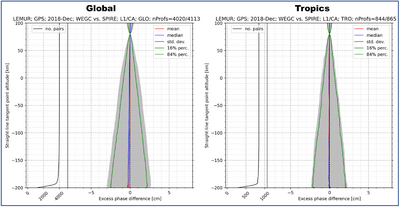EOPCLIMTRACK
Project name: | EOPCLIMTRACK – Evaluation of Reference Occultation Processing Excess Phase Data for Preparing Climate Change Tracking |
Project leader: | Gottfried Kirchengast |
Projekt team: | Marc Schwärz (Project Manager, Senior Scientist) Barbara Angerer (Scientist) Josef Innerkofler (Scientist) Florian Ladstädter (Postdoc Scientist Adviser) Armin Leuprecht (Senior Scientist Adviser) |
Partners: | National Space Science Center/Chinese Academy of Sciences (NSSC/CAS), Beijing, CN, Spire Global Inc. (Spire); Data Provision and Advice |
Sponsor: | FFG-ALR (Austrian Research Promotion Agency - Austrian Aeronautics and Space Agency); ASAP-13 (Austrian Space Applications Programme 13th Call) |
Duration: | Feb. 2017 – May 2019 |
Abstract:
Monitoring the atmosphere to gain accurate and long-term stable records of essential climate variables (ECVs) such as temperature or related variables is the backbone of atmospheric and climate science. Earth observation from space is the key to obtain such data globally in atmosphere. GNSS radio occultation (RO) provides a unique tool for such monitoring in the free atmosphere as it enables to tie RO-derived ECVs and their uncertainty to fundamental time standards and to their unique long-term stability and narrow uncertainty. In previous projects, the Wegener Center has developed and initially validated the new Reference Occultation Processing System (rOPS) that realizes this full chain from RO raw data via atmospheric excess phase data, corresponding to along-ray integrated refractivity, to derived ECVs with integrated uncertainty propagation.
With the EOPCLIMTRACK project, the Wegener Center has built on the rOPS development efforts of the previous projects, with the overall aim to boost the availability of new RO mission data and the quality of these data. Towards this overall goal, the project aimed to strengthen the rOPS Level 1a excess phase data, which by their nature as integrated refractivity react sensitively to temperature and moisture changes due to climate change, through preparing ingestion and performing excess phase data quality evaluation for promising RO data from new missions not yet used internationally so far. These new missions include the FengYun-3 (FY-3) series of Chinese polar-orbiting operational meteorological satellites, with the GNSS occultation sounder (GNOS) as RO instrument on board, and the emerging CubeSat RO constellation of Spire Global, Inc.
The overall aim was worked on and achieved along two specific project objectives as follows:
1) Expansion of the Level 1a data basis due to integration of the new FY-3/GNOS and Spire RO mission data into the rOPS Level 1a processing, ingesting GPS orbit data and the Level 0 data of the new missions for computing Level 1a excess phase data of highest possible quality;
2) Evaluation of the rOPS Level 1a excess phase data quality by a co-location analysis approach using a range of test months of FY-3/GNOS and Spire RO event data and close collocations with the high-quality RO event data of the European operational MetOp-A/-B satellites.
Figures 1 and 2 below illustrate the methodological approach and example results of the work.
The EOPCLIMTRACK project helped to further strengthen the climate-quality rOPS RO data records, by enabling ingestion of the new FY-3/GNOS and Spire RO data and by carefully evaluating their quality against the European MetOp data directly at the excess phase data level. This holds high promise for climate uses due to the generally small excess phase uncertainties and independence from background information.









